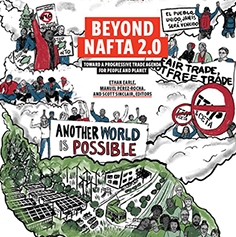Image courtesy of Our Sound, Our Salmon
The Canadian fish farm corporation, Cooke Aquaculture, threatened to use the North American Free Trade Agreement’s (NAFTA) investor-state dispute settlement arbitration courts as a last resort to avoid Washington State lawmakers from approving a ban on the farming of Atlantic salmon in the state. The company has reported that it would seek to make $76 million from taxpayers if such a ban is passed. This threat is a case study example of how corporations use ISDS to threaten regulations that protect the environment and infringe upon the democratic governance of communities over their economy and ecosystems.
The ban was been introduced as a bill in the Washington legislature after Cooke Aquaculture allowed for over 200,000 Atlantic salmon to be released into the Salish Sea, gravely threatening the already weakened native Pacific salmon. State agencies have found that the company’s negligence had led to the escape, also reporting that the company had misled the general public and state agencies in the reports of how many fish had espaced their farms. Additionally, five of the company’s nine pens have had their leases terminated due to violations identified during inspections by state agencies. The bill, which has been passed in the House and awaits for Senate approval, is supported by Governor Jay Inslee and is expected to pass.
Washington Treaty Tribes have insisted on passing legistlation in order to protect the Salish Sea ecosystem and their the tribes’ rights to pursue their way of life in relation to its natural resources from the invasive Atlantic salmon species cultivated by Cooke Aquaculture. A statement by the Washington Treaty Tribes Chairs reads: “A healthy and productive Salish Sea is essential to our way of life and to our survival. We have harvested Pacific salmon (native salmon) since time immemorial and we have an inherent right, secured by Treaty with the United States, to continue to pursue our way of life of gathering, hunting and harvesting natural resources. Along with this right comes a sacred obligation to protect our native salmon.”
In response to Cooke’s threat, Sierra Club Responsible Trade Program Director Ben Beachy released the following statement: “Once again, a corporation is using NAFTA to openly threaten lawmakers because the well-being of a community and its ecosystem is being put first. The corporate protections at the heart of NAFTA — including ISDS — must go. Communities should have the power to protect their air, water, and livelihoods without fear of being sued in undemocratic tribunals by multinational corporations. We hope Canada heeds the tireless calls of communities across North America to completely remove ISDS and other corporate handouts from NAFTA. This would be an important step, but only the first step. To produce a deal that benefits our communities, NAFTA’s protections for corporations must be replaced with binding protections for workers and the environment.”
As NAFTA negotiations continue, we must pressure lawmakers and negotiators to eliminate ISDS from all trade deals. Such abuses by powerful corporations cannot continue if we are to ensure we have a healthy environment, respect for democracy, and protection for our human rights.s
A coalition of organizations has begun the Our Sound, Our Salmon campaign to push for regulations that protect Pudget Sound and the Salish Sea from these abuses. To learn more about their campaign and how to take action, click here.

